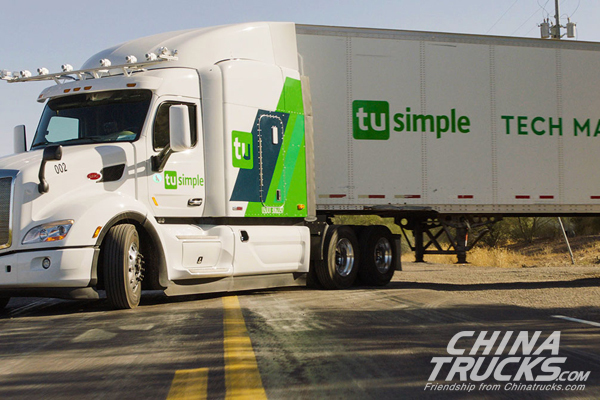Autonomous Trucks to Haul Cargo in Arizona
January 23,2018

Beijing- and San Diego-based tuSimple has a supplier committed to the project, which will run trucks the 120 miles from Tucson to Phoenix, Partner and Vice President of Product Chuck Price told Transport Topics. He declined to identify the supplier.
“We are testing at our Tucson facility in the first half of the year. By September, we will move to [operating for] a commercial shipper of cargo to generate revenues,” Price said.
The tuSimple systems will be installed in Peterbilt trucks that will run at autonomous Level 4 of High Automation, defined as a vehicle system capable of conducting all driving without human control except in special circumstance, such as a traffic jam. Price said a driver will be behind the wheel for the Arizona runs.
TuSimple conducted successful tests last summer of its Level 4 systems in China and on a 200-mile run from San Diego to Yuma, Ariz. TuSimple does not build trucks but provides the “stack” of autonomous technology that includes Nvidia graphics processing units (GPUs) and its Drive PX computer system, along with multiple radar and camera sensors.
A series of commercial runs using Level 4 systems would be a big step for autonomous technology in Class 8 trucks. The tuSimple system trucks are capable of running themselves as they travel from on-highway to off-highway and in depot parking lots, Price said.
In 2016, Uber’s self-driving truck subsidiary, Otto, conducted with Anheuser-Busch a driverless 120-mile beer delivery in Colorado. Last October, autonomous technology firm Embark teamed with Ryder to haul Frigidaire products between Texas and California. Both ran driverless on highways but switched to human control for merges and off-highway driving.
TuSimple, formed in 2015 in China by Mo Chen and Xiaodi Hou, has raised $83 million from Chinese investors and Nvidia, according to CrunchBase.
The company seeks to build out 50 trucks equipped with its autonomous systems, with an annual goal of hauling commercial freight at Level 4 for 3 million miles, Price said. It plans to outfit 25 Peterbilt Model 579 trucks in the United States and 25 Shaanxi Automobile Group trucks in China with its systems.
The firm also will offer an extensive maintenance program. Its business model calls for users to pay a base charge and a recurring subscription fee. In return, the users get the tuSimple technology and staff training, in addition to system and software updates as the program evolves, Price said.
The firm also will find and fix a vehicle if a problem occurs that takes it out of commission.
“Let’s say the vehicle is disabled — due to weather, a blowout, a system failure — we can detect this and move it remotely or rescue it for the fleet customer,” he said. “We work to ensure [the system] works in all conditions. You can’t leave $1 million in product sitting on the side of the road.”
TuSimple takes a different approach from some of its autonomous technology competitors.
It opted for radar technology over the widely used lidar systems as radar can sense objects up to 300 meters away and respond, while lidar claims about 150 meters. That extra distance is important for trucks where short stopping distance is essential, Price said.
Radar works better in rough weather and it’s cheaper, he noted.
And tuSimple deliberately chose to headquarter in San Diego, away from Silicon Valley, where many new technology companies settle.
“Our plan is to be the first commercial [Class 8] operator. It’s not our goal to just do demos and get acquired,” Price said. “We build technology that really works. We want to be out of Silicon Valley where there is pressure to get bought.” (www.chinatrucks.com)
Source : ttnews
Views : 5329
Tags : tuSimple Autonomous Trucks








